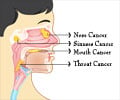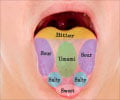Taste sensitivity is diminished in cancer survivors even after recovery taste due to damaged tongue signaling system.

Diminished taste sensitivity in taste buds is due to damaged chorda tympani facial nerve branches that carry signals from the tip of the tongue to the brain during radiation therapy.
"While most studies suggest that patients' ability to taste recovers within a few months of treatment, patients report that they continue to experience taste dysfunction for years after treatment ends”, said M. Yanina Pepino, a professor of food science and human nutrition at the U. of I.
The research team assessed participants' smell and taste functions separately to explored the sensory interactions between taste and retro nasal odors - aromas from food and beverages that are perceived in the oral cavity while eating or drinking.
The ability to taste is tested by applying cotton swabs soaked in flavored solutions to the tip of their tongue. Whole-mouth taste function is done by swishing solutions around their mouths for five seconds and spit them out. Later the taste quality is identified.
Participants also tasted the samples twice - once wearing a nose clip and once without - to determine the difference in their taste perception.
Advertisement
When participants' sense of taste is assessed regionally at the tip of the tongue, the cancer survivors were more likely to respond they did not perceive a taste or to misidentify the taste quality - such as bitter, salty or sweet - of multiple samples.
Advertisement
Source-Medindia















